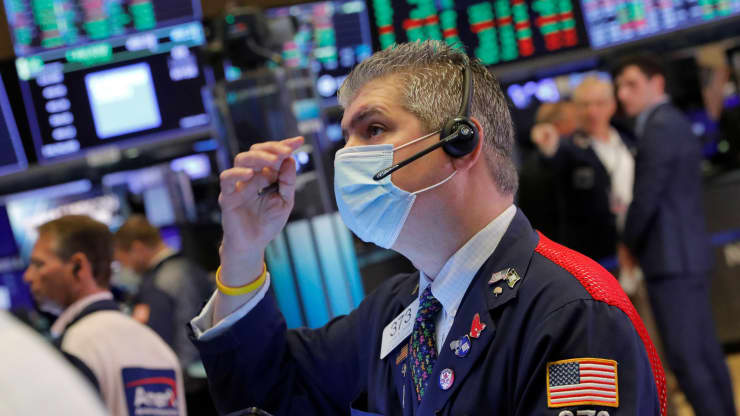
The S&P 500 churned higher Thursday in the face of concerns about the Federal Reserve removing stimulus.
The broad index inched up 0.1% to 4,405.80. The Nasdaq Composite added 0.1% to 14,541.79. The Dow Jones Industrial Average shed 66.57 points, or nearly 0.2%, to 34,894.12.
The S&P 500 snapped a two-day losing streak while the Dow logged its third-straight losing session. Meeting minutes released Wednesday from the Fed’s gathering in July showed the central bank has started eyeing tapering its $120 billion in monthly bond purchases before the year-end.
For the week, the three major indexes are in the red.
“The recent bout of market angst seems to be a combination of investor vertigo, looking for an excuse to take profits, and the bumpy path of reopening the economy, with new Covid variants on the rise,” Art Hogan, chief market strategist at National Securities, said in a note.
Shares of tech stocks including Microsoft and Netflix closed in the green on Thursday.
Nvidia’s stock jumped 3.9% after the chip giant’s quarterly earnings and revenue beat Wall Street estimates amid strong graphics cards sales.
“I don’t think we’re in a bubble, which is what I think many bears think we are,” innovation investor Cathie Wood said on CNBC’s “Tech Check.” “We’re focused on the deflationary forces that are building up in the economy.”
Defensive stocks like consumer staples and health care names also gained. Procter & Gamble and Merck added nearly 1.2% and 0.8%, respectively.
Meanwhile, stocks closely linked to the economy led losses. Steelmaker Nucor lost 2.7%. Oil companies Devon Energy and Occidental Petroleum shed 3% and 5.8%, respectively. Miner Freeport-McMoRan fell 4.3%. General Motors fell 3.4%. Reopening plays like airlines also closed lower.
WTI crude oil dropped more than 2%, to settle at $63.69, and copper lost nearly 2% on concern about global growth without the Fed’s bond-buying support. The 10-year Treasury yield slipped to 1.24% late in the afternoon. (1 basis point equals 0.01%.)
Robinhood shares tumbled 10.2% after its first earnings report as a public company. The app warned investors that its third-quarter results could be affected by a slowdown in trading.
“For the three months ended September 30, 2021, we expect seasonal headwinds and lower trading activity across the industry to result in lower revenues and considerably fewer new funded accounts than in the prior quarter,” the company said in the earnings release.
Investors digested mixed economic data released Thursday. First-time jobless claims last week hit a new pandemic-era low at 348,000, declining more than expected from the week prior.
The Philadelphia Fed Index, a gauge of growth in the region, still indicated expansion but at a level worse than expected. The August reading was 19.4, below the 22 consensus of economists polled by Dow Jones.
Goldman Sachs cut its economic growth forecast for the current quarter to 5.5% from 9%, adding to the negative sentiment. The firm also sees higher inflation than expected for the rest of the year.
“The impact of the delta variant on growth and inflation is proving to be somewhat larger than we expected,” wrote Jan Hatzius, chief economist at Goldman Sachs, in the note.